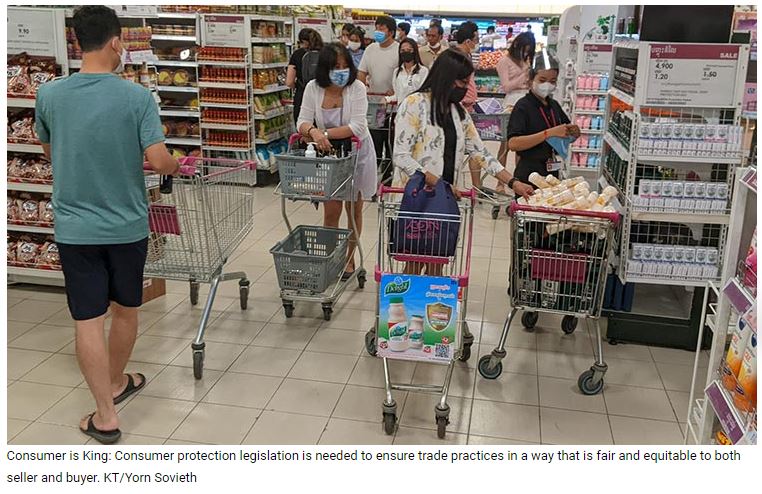Cambodia’s Consumer Rights: Public understanding and perception
The government adopted legal Consumer Protection Laws in late 2019, making Cambodia home to one of the youngest Consumer Protection Regimes in the world with various sub-decrees and regulations still in development
In a free-market economy, consumer protection legislation is needed to ensure trade practices are conducted in a way that is fair and equitable to both seller and buyer. Consumer rights achieve this by providing legal redress for consumers if they are sold items that do not meet the quality, potency, quantity, purity, price and standard that was promised when purchasing the product.
This ensures customers can make well-informed decisions about their purchases and protect their financial interest if they have been misled, but did you know that consumer rights also mandate a list of responsibilities for the consumer as well.
The Konrad-Adenauer-Stiftung (KAS) foundation, a German political institute committed to the global fostering of democracy and human rights standards recently released their 19th edition of Law Talk, which took a comprehensive look at consumer protection in Cambodia and is available for free online.
The publication includes a survey of Cambodian residents (the majority of whom were undergoing bachelor’s degree education) to assess the awareness of their rights as consumers – the results showed that participants had a fairly robust understanding, but some areas lacked significantly more than others.
“The results showed that among the five basic consumer rights represented in the survey, 88 percent and 84 percent of respondents were aware of rights to safe goods and services and rights to choose, respectively. Whereas, six in ten respondents were aware of rights to claim and get compensation and rights to be informed. At the same time, only four in ten respondents were aware of the rights to be heard of concerns.”
Consumer Protection law also mandates responsibilities on the consumer, which should be adhered to just as strictly as the consumer’s rights. These responsibilities include the responsibility to retain receipts, follow usage instructions, expose/report bad business, provide feedback when dissatisfied, obtain sufficient information and understand the product prior to purchase. The KAS survey assessed the understanding of these requirements.
“The result showed that among basic consumer responsibilities illustrated in UNGCP, the responsibility to ask questions/obtain sufficient information pre-purchase was known by the majority of respondents (75.7 percent). It is followed by responsibility to follow product/usage instructions and to use the product safely (70.3 percent), responsibility to understand the environmental consequences of one’s consumption and contribute to a healthy environment (62.2 percent), responsibility to provide feedback when dissatisfied with product/service quality (59.5 percent), responsibility to expose/report bad business and protect common interests/fellow consumers (52.7 percent), and responsibility to retain receipts (50 percent).”
With an adequate level of awareness considered, the survey assessed the public’s view on the implementation and adherence to consumer rights in the Kingdom. The consensus is that more work is needed from the marketers, manufacturers and government to uphold the legal framework so that it can be effectively relied upon. One respondent said: “I don’t see enough commitment from either traders or the government to guarantee the rights to the safety of consumers. The truth can be seen in today’s society. I see a lot of sellers advertising their homemade and imported cosmetic products through online platforms, and I also see a lot of cases publicised on social media about the negative impact of those products on the health of consumers.”
The government adopted legal consumer protection laws in late 2019, making Cambodia home to one of the youngest consumer protection regimes in the world with sub-decrees and regulations still in development. Therefore, it is reasonable to learn that some areas in the framework and enforcement need more development.
Active measures are being taken to develop integral cross-border trade practice, as demonstrated at their SeT4SME (Improving Small Package e-Trade for SMEs)event held in Phnom Penh last week, where numerous public and private entities partnered to upgrade their information systems. Naturally, as package information and data becomes freely available to governing bodies, so to will the enforceability of the consumer protection framework.
The improvement of operations in conjunction with the ongoing development of legislature suggests that the framework around consumer rights is heading in the right direction and that The Kingdom continues to thrive forward in its mission to house contemporary markets.
Appreciating the government, Dr Daniel Schmücking, Country Director of Konrad Adenauer Stiftung Cambodia said, “Cambodia has made considerable strides in consumer protection legal development. Some of the recent positive developments include the country’s adoption of the relevant sub-decrees ensuring the implementation and enforcement of the Law on Consumer Protection. We are proud to learn that some consumer protection-related regulations, particularly the ones recommended in our publication, are currently being drafted. In my opinion, the government should continue to engage in open dialogues to gather more constructive recommendations from legal experts from both locally and regionally, in order to improve the implementation and enforcement of the Consumer Protection Law.”
Source: https://www.khmertimeskh.com/501025223/cambodias-consumer-rights-public-understanding-and-perception/


 English
English




